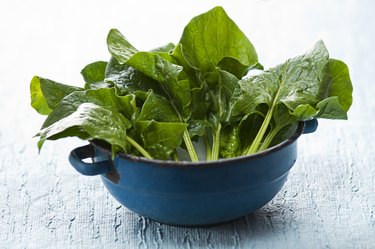
Acid reflux refers to the flow of stomach acid back into your esophagus, a connecting tube between your throat and stomach. It is also known as gastroesophageal reflux and occurs as heartburn, a burning sensation in your chest. Acid reflux can progress into gastroesophageal reflux disease, or GERD, a more severe form of the condition. Other symptoms include wheezing, coughing, difficulty swallowing and chest pain.
Treatment can include medications and lifestyle changes. Consuming a well-balanced diet, rich in specific vitamins, may also help relieve and manage symptoms of reflux.
Video of the Day
Video of the Day
Vitamin B-12
According to a study in the October 2006 Journal of Pineal Research, supplementing your diet with vitamin B-12 may aid in the regression of GERD symptoms, a more severe form of acid reflux. Vitamin B-12 can be obtained in a supplement form. You can also find this vitamin in animal-based foods including poultry, red meat, fish, eggs, and dairy products. If you are vegetarian or vegan and consume no animal products, you may be deficient in this vitamin. You can talk to your doctor about taking a supplement.
Folic Acid and Vitamin B-6
Folic acid, a B vitamin, and vitamin B-6 are two other vitamins that may aid in reducing symptoms of acid reflux. The 2006 study in the Journal of Pineal Research found that GERD symptoms were relieved upon supplementing the diet with these vitamins. Folic acid, also called folate, can be taken in supplement form. You can also find it in foods such as beans and green leafy vegetables.
Whole grain and breads and cereals may also be fortified with this essential vitamin. Vitamin B-6 can be found as a supplement or in foods such as meat, poultry, beans, whole grains, fruits and vegetables.
Vitamins A and C
A 2012 scientific paper published in Collegium Arthropologicum found that diets high in antioxidants, including vitamins A and C, may help prevent GERD. Antioxidants act to protect your body from free radical damage, substances that cause cellular damage, infection and illness in your body. This can worsen or trigger your acid reflux symptoms.
Consuming a multivitamin that includes vitamins A and C may help with your digestive health and relieve your symptoms, according to an Osijek University study. These vitamins are antioxidants and are available in both supplement form and your diet. Good dietary sources of vitamin A include liver, eggs, sweet potatoes, squash, carrots and spinach. Good sources of vitamin C include bell peppers, broccoli, oranges, limes, lemons and kiwis.
Vitamin E

Vitamin E is another antioxidant that may help offer protection against the development of GERD. In addition its antioxidant power, vitamin E also supports immune and heart health. Due to potential health concerns with vitamin E supplementation, namely risk of stroke, you should only take vitamin E supplements under the direction of your doctor. However, you can find this essential vitamin in a variety of foods such as spinach, olive oil, avocado, nuts and nut butter.
- Penn Medicine: Gastro Esophageal Reflux Disease (GERD)
- Medline Plus: Antioxidants
- Wiley Online Library: Regression of gastroesophageal reflux disease symptoms
- hrcak: The Impact of the Vitamins A, C and E in the Prevention of Gastroesophageal Reflux Disease, Barrett’s Oesophagus and Oesophageal Adenocarcinoma
Is this an emergency? If you are experiencing serious medical symptoms, please see the National Library of Medicine’s list of signs you need emergency medical attention or call 911.